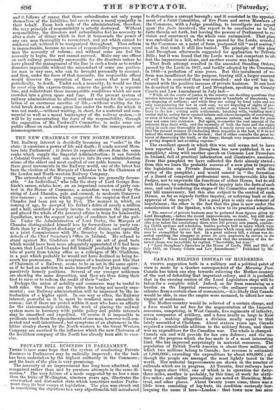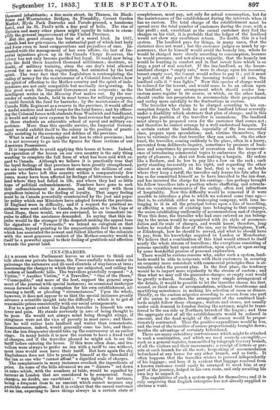CANADA HELPING INSTEAD OF HINDERING. A rsEanr, suggestion both in
a military and a political point of view is made by a Quebec correspondent of the Morning Post. Canada has taken one step towards relieving the Mother-country of the cost of defending that important colony, and it hi probable that in the ensuing session of the Local Legislature steps will be' taken for a complete relief. Indeed, so far from remaining 'as a burden on the Imperial resources,—the ordinary reproach of colonies from a certain class of economists,—it is likely that Canada would be able, in case the empire were menaced, to afford her con- tingent of assistance.
The Mother-country would be relieved of a certain-charge, and a force would be set free for the augmentation of the Imperial resources, comprising, in West Canada, five regiments of infantry, seven companies of artillery, and a force nearly as large inf4ak Canada ; making altogether a division nearly equal tcc that' lately assembled at Chobham. About sixteen years ago, Canada: required a considerable addition to the military forces, and there was an expenditure for the Canadian war. The whole is change& Canada can and will provide for her own defence; and the ma- ture of the progress which she has made is of a most -interesting kind. She has improved surprisingly in material resources. The population of British North America is about three millions, lof which two millions belong to Canada ; her revenue is estimated at 1,000,000/., exceeding the expenditure by about 400,000/. ; though the people are amongst the most lightly taxed in the world. Her material improvements are shown in the number of railroads which are in progress. At Toronto, four railways have been begun since 1861, one of which is in operation for forty. three miles, another is probably, by this time, at work for sixty- five miles; and similar proceedings are noted at Hamilton; Mon- treal, and other places. About twenty years since, there was a little town consisting of lop,;-huts, its condition euriousty lesquing the name it bore—London : that town now has nine thousand inhabitants' a inezoria street, its Thames, its Black- friars and Westminster Bridges, its Piccadilly, Covent Garden Market, Hyde Park Barracks and Parade-ground, a handsome hotel, and its St. Paul's with a fine peal of bells. The rise of Bytoiva and many other places might equally be taken to exem- plifsi She general improvement of the United Province. mut,the, grand change has been of a moral kind. In 1837, Optada had her grievances, the substantial part of which lent body oreeleven to local exaggerations and prejudices of race. In- iwith the management of her own affairs, the last of Im- injustioes given up in the Canada Clergy Reserves, the colony has not only become pacified but loyal. It could now bring
Late the field three hundred thousand militiamen; destitute, no doubt,of military training, since the one day's trial allowed served for no more than registration, but animated by the best
spirit. The very fact that the Legislature is contemplating the outlay, of money for the maintenance of a Colonial force shows how the spirit of affection. to the Mother-country and the spirit of inde-
pendpuee are not only compatible but mutually invigorating. In
this good work the Imperial Government can cooperate; as the intelligent writer in the Morning Post makes out. By the sur-
render of certain lands, held in most towns for military purposes, it could furnish the fund for barracks ; by the maintenance of the Canada Rifle Regiment as a reserve in the province, it would afford a useful nucleus and model corps for the local forces; and by officer- ing the Colonial forces with students from Woolwich and Sandhurst, it would not only save expense to the local revenue but would give to those students an admirable school of naval and military ex- perience. More than this specific service, the Imperial Govern- ment would exhibit itself to the colony in the position of practi- cally assisting in the economy and defence of the province. What is said of Canada applies not less to other provinces ; but it is not necessary to go into the figures for those sections of our American Possessions.
- It is impossible to avoid applying this lesson at home. Indeed, the operation of the lesson on our own country is the only thing wanting to complete the full force of what has been said with re- gard to Canada. Although we believe it is practically true that the loyal feelings of that province have been greatly strengthened, we are nevertheless well aware that amongst the millions of emi- grants who have left this country within a comparatively few years, many have been affected by feelings of bitterness towards a land where they had failed in life, and where they had so little hope of political enfranchisement. Numbers have gone to seek that enfranchisement in America, and they carry with them
prejudices inimical to the feeling of loyalty. That angry feeling must be in Canada powerfully counteracted by the just and popu- lar policy which our Ministers have adopted towards the province.
If England were in difficulty, and if a request for practical as- sistance were sent either to Canada, to Australia, or to the Cape of Good Hope, there would, we are convinced, be an immediate im- pulse to afford the assistance demanded. In saying that this im-
pulse would be the stronger if the despatch making the appeal bore the signature of " Newcastle' " we intend no eulogium on that statesman, beyond pointing to the unquestionable fact that a name which has associate(' the newest and fullest liberties of the colonists with the most generous conduct of the Mother-country would in itself be a powerful appeal to their feeling of gratitude and affection towards the parent land.



























 Previous page
Previous page